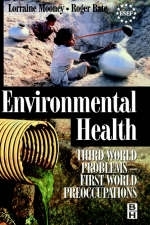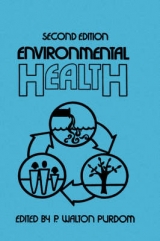
Environmental Health
Third World Problems - First World Preoccupations
Seiten
1999
Butterworth-Heinemann Ltd (Verlag)
978-0-7506-4223-1 (ISBN)
Butterworth-Heinemann Ltd (Verlag)
978-0-7506-4223-1 (ISBN)
- Titel erscheint in neuer Auflage
- Artikel merken
Zu diesem Artikel existiert eine Nachauflage
Talks about the differences in health priorities that exist around the world, and cautions against the export of inappropriate attitudes from developed to less developed countries.
This book underlines the differences in health priorities that exist around the world, and cautions against the export of inappropriate attitudes from developed to less developed countries. Case studies of malaria in South Africa and cholera and Peru show the fatal consequences of allowing western preoccupations with trivial risks (such as the cancer effects of pesticide residues in foods and chlorine compounds in water) to influence health policy in the third world. The western health paradox - we are healthier yet more concerned about our health - is described, and the sociological factors that explain the paradox are examined. We discover why people needlessly worry themselves to the point of illness. Numerous examples of western health concerns are shown to be folly or hugely exaggerated. Nitrates in drinking water, industrial use of organic chlorine (such as PVC and other plastics, pesticides, PCBs, Dioxin) and speculation about declining sperm counts are systematically exposed. Perhaps worst of all, measures prompted by concerns for public safety may be making us less safe.
Food poisoning incidents appear to be increasing and much of the blame can be laid at the door of excessive government nannying. This book provides an up-to-date discussion of current issues surrounding health.
This book underlines the differences in health priorities that exist around the world, and cautions against the export of inappropriate attitudes from developed to less developed countries. Case studies of malaria in South Africa and cholera and Peru show the fatal consequences of allowing western preoccupations with trivial risks (such as the cancer effects of pesticide residues in foods and chlorine compounds in water) to influence health policy in the third world. The western health paradox - we are healthier yet more concerned about our health - is described, and the sociological factors that explain the paradox are examined. We discover why people needlessly worry themselves to the point of illness. Numerous examples of western health concerns are shown to be folly or hugely exaggerated. Nitrates in drinking water, industrial use of organic chlorine (such as PVC and other plastics, pesticides, PCBs, Dioxin) and speculation about declining sperm counts are systematically exposed. Perhaps worst of all, measures prompted by concerns for public safety may be making us less safe.
Food poisoning incidents appear to be increasing and much of the blame can be laid at the door of excessive government nannying. This book provides an up-to-date discussion of current issues surrounding health.
Executive summary; Malaria and DDT; cholera and chlorine; sociology of health panics; ecological risk - actual and hypothetical; food scares; nitrates; the end of chlorine; natural organochlorines; nature's hormone factory; sperm counts; commentary; index.
| Erscheint lt. Verlag | 25.1.1999 |
|---|---|
| Zusatzinfo | Illustrations |
| Verlagsort | Oxford |
| Sprache | englisch |
| Maße | 156 x 234 mm |
| Gewicht | 538 g |
| Themenwelt | Medizin / Pharmazie ► Gesundheitswesen |
| Wirtschaft ► Betriebswirtschaft / Management ► Unternehmensführung / Management | |
| ISBN-10 | 0-7506-4223-8 / 0750642238 |
| ISBN-13 | 978-0-7506-4223-1 / 9780750642231 |
| Zustand | Neuware |
| Haben Sie eine Frage zum Produkt? |
Mehr entdecken
aus dem Bereich
aus dem Bereich
wie man Menschen wirklich weiterbringt
Buch | Softcover (2024)
Vahlen (Verlag)
26,90 €
Buch | Softcover (2023)
Springer Gabler (Verlag)
32,99 €
ein Navigationssystem für Führungskräfte
Buch (2023)
Carl-Auer Verlag
34,95 €



